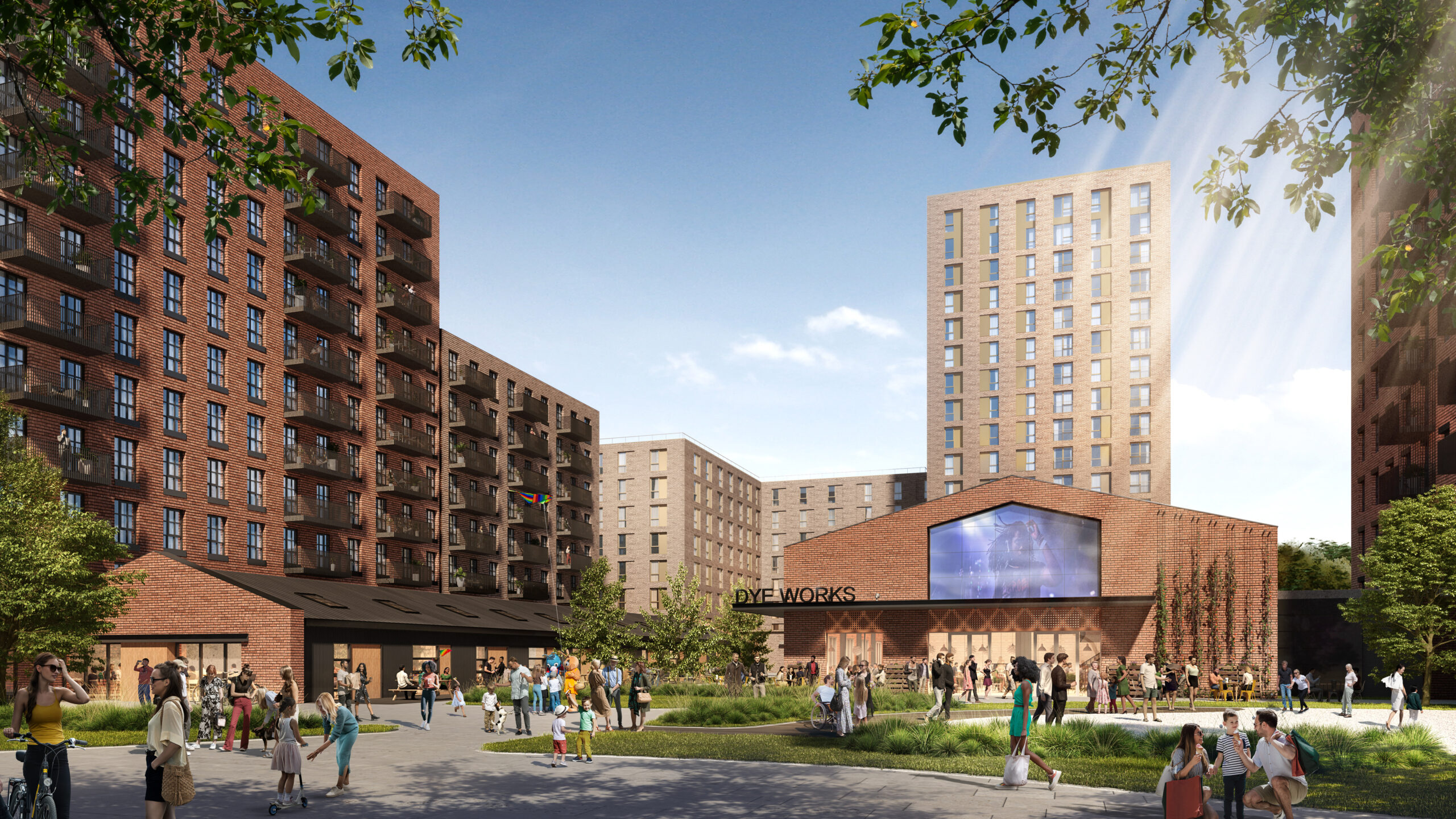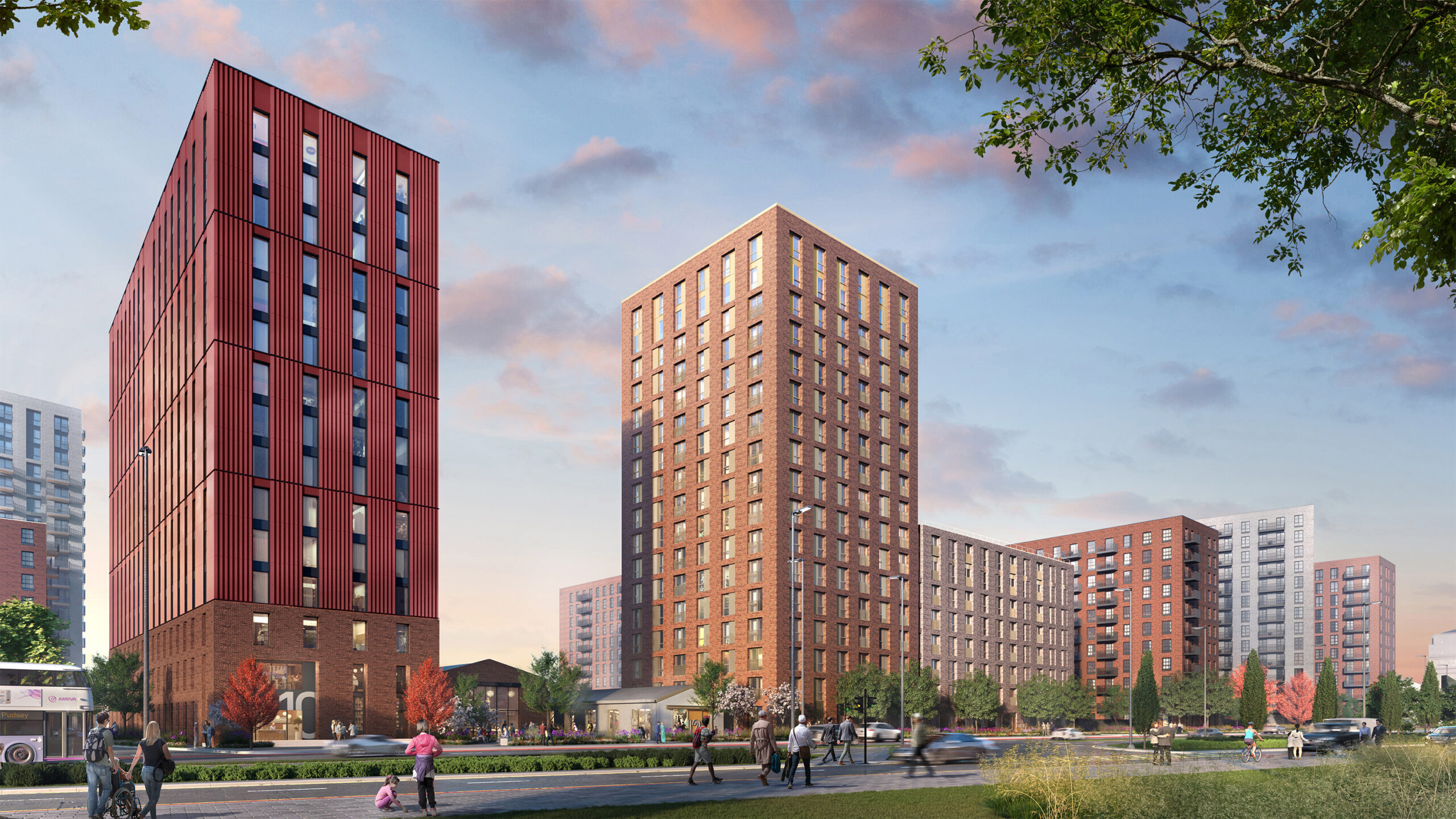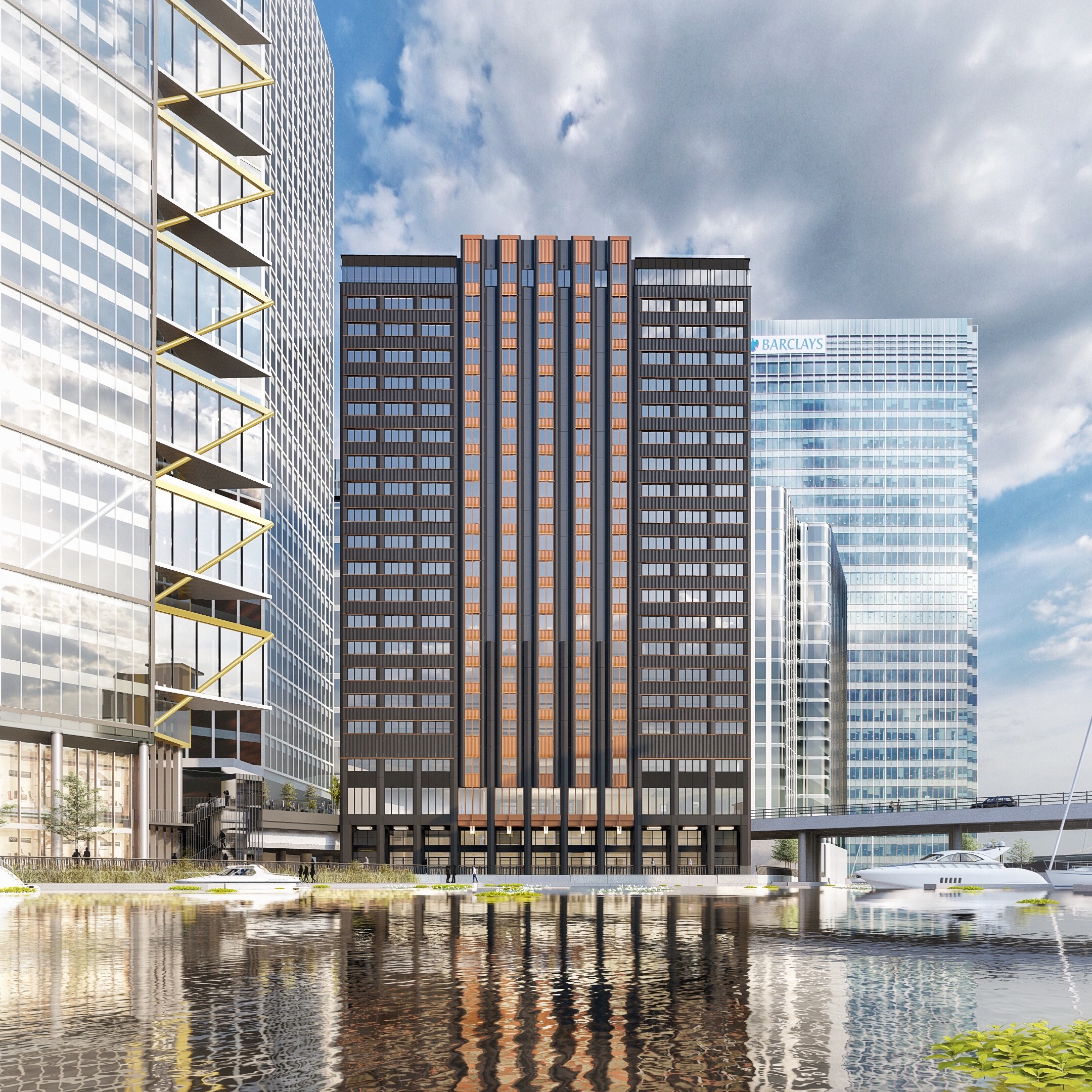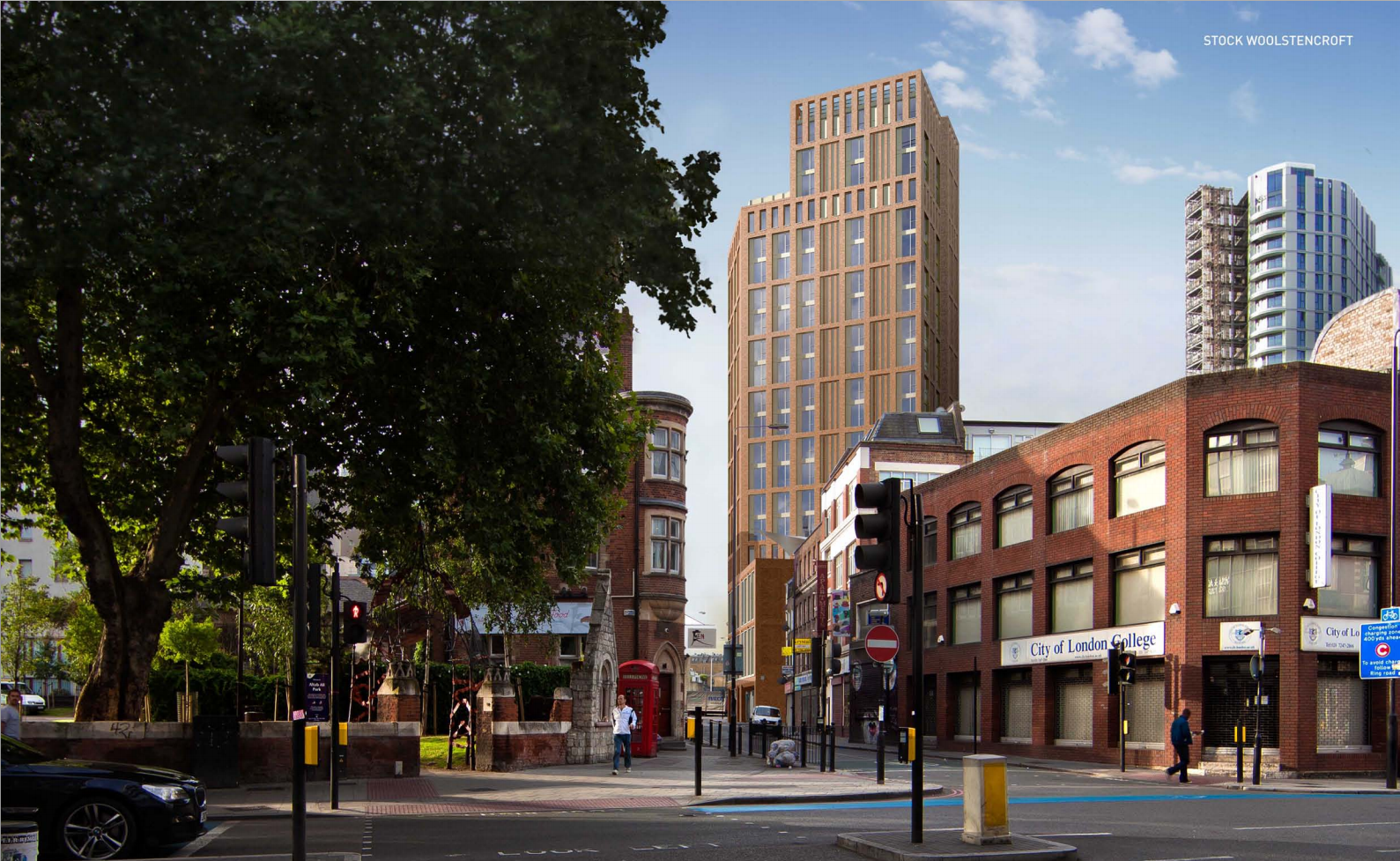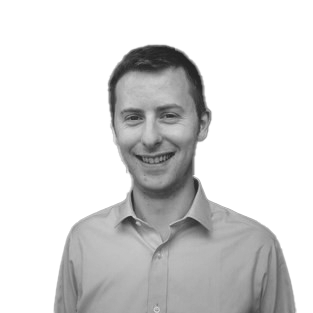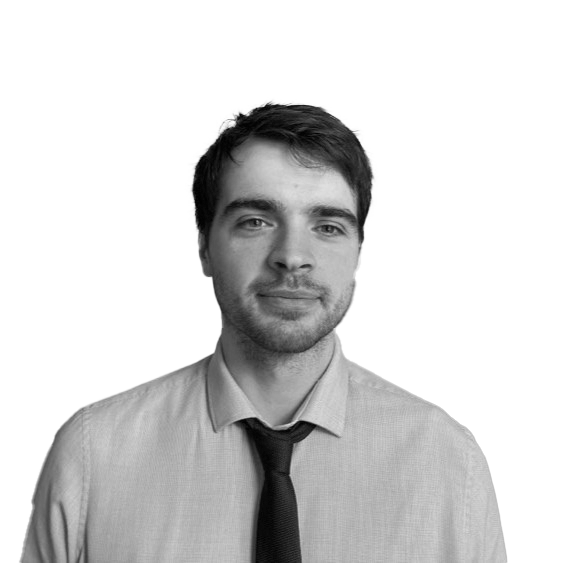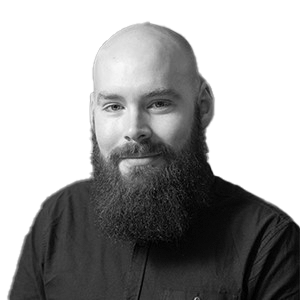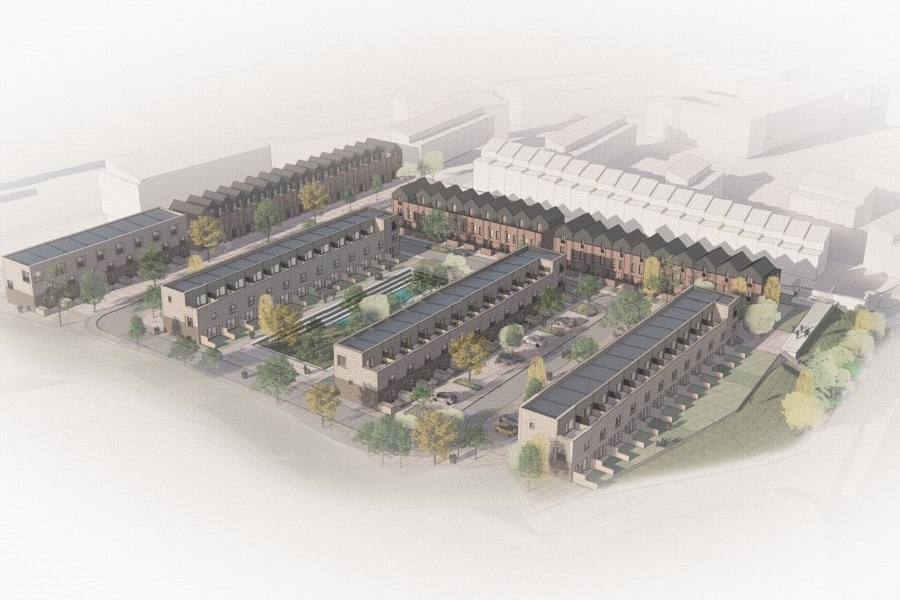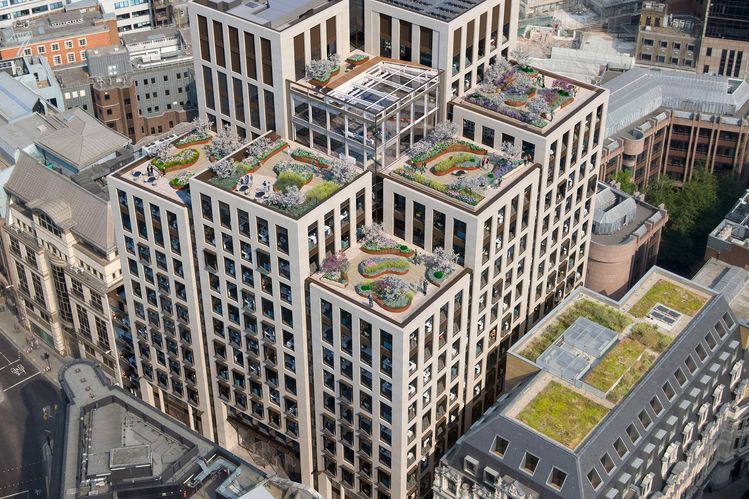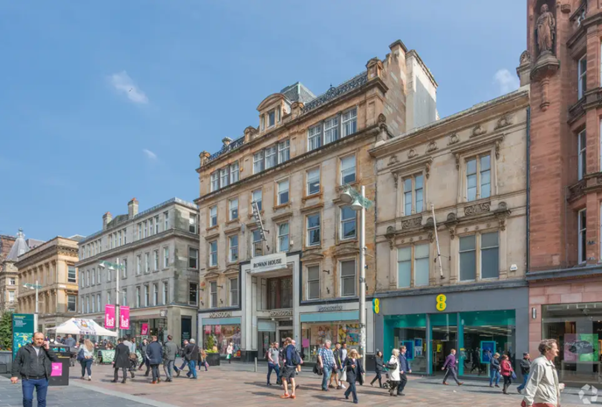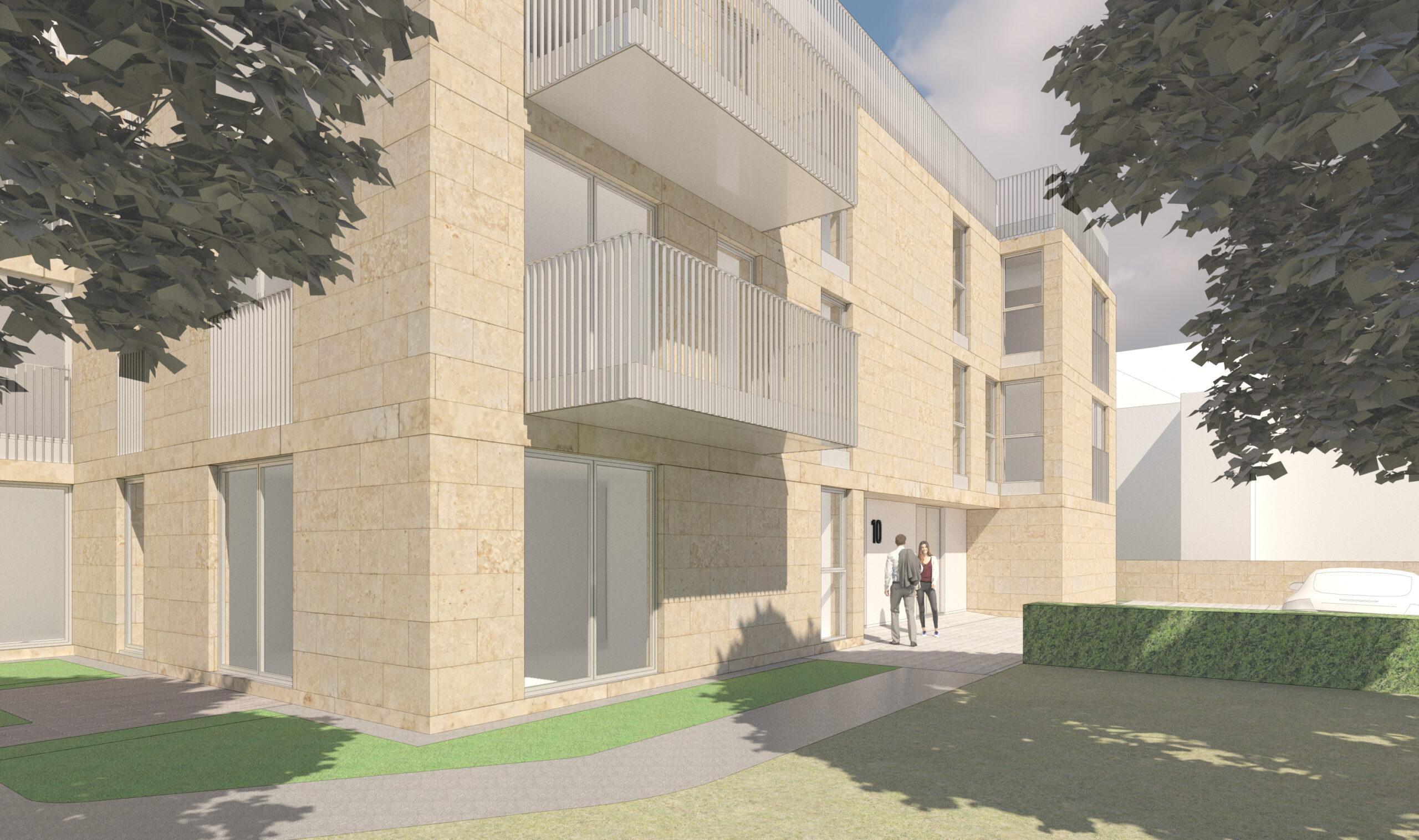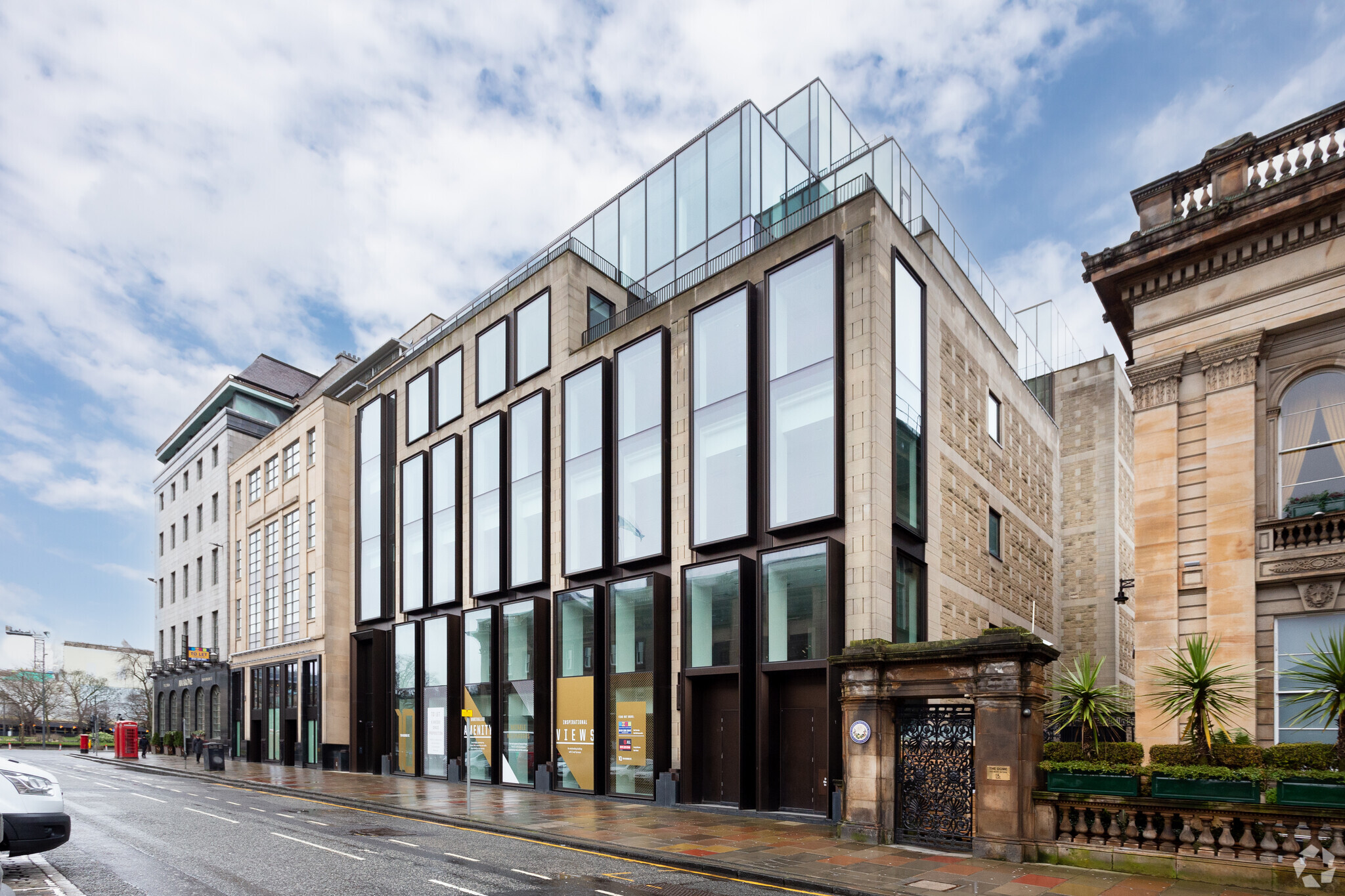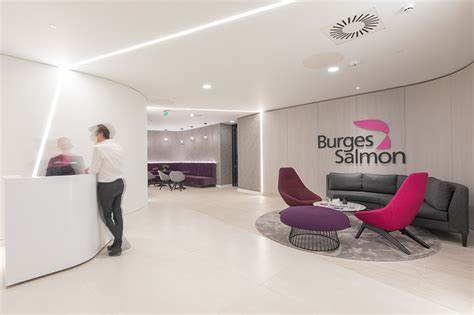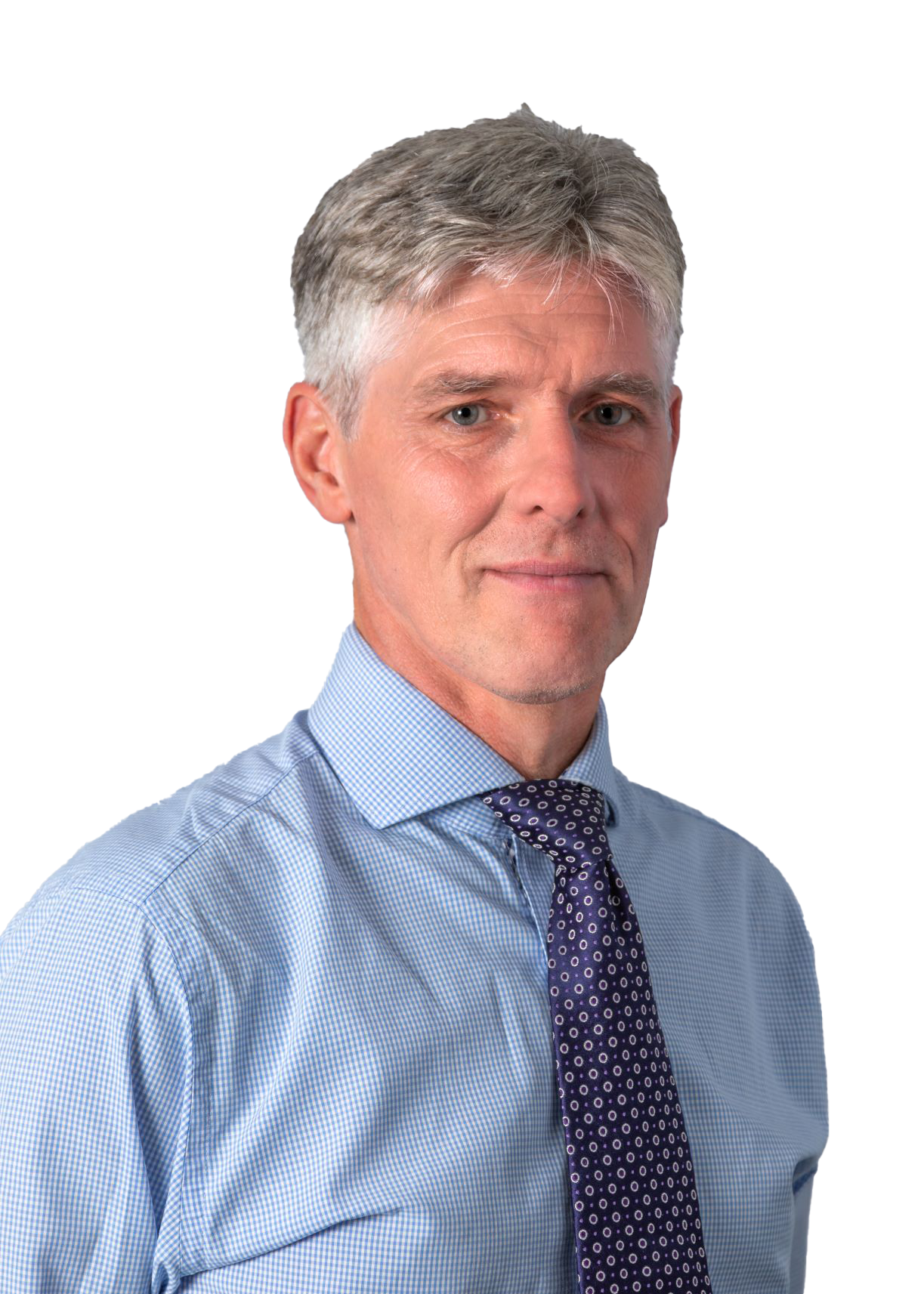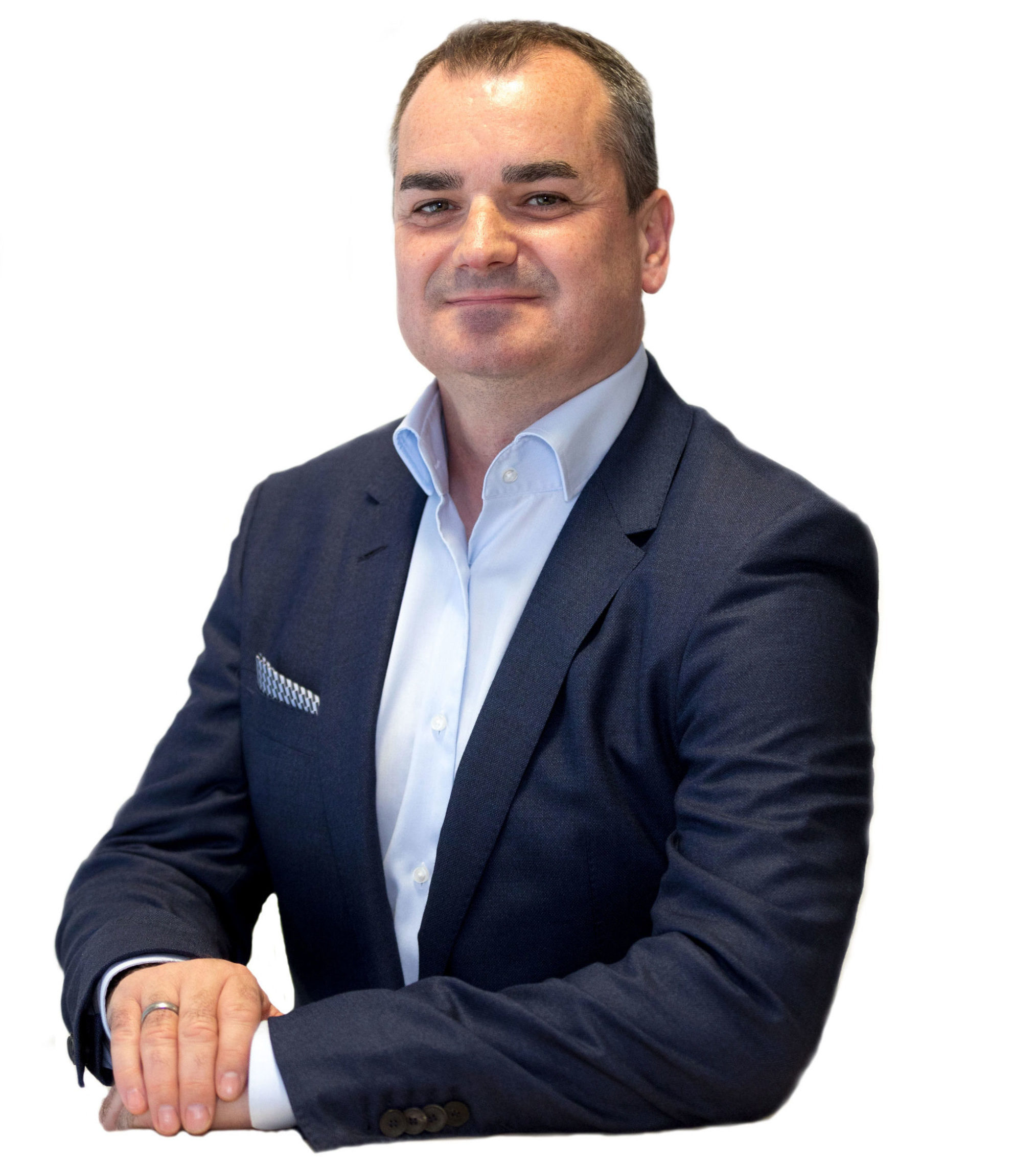Dagenham Dock
Dagenham Dock
Wallace Whittle are proud to be involved in the Dagenham Green project for Dagenham Dock Limited/Peabody, which has recently received approval for an outline planning permission for a mixed use development of up to 3502 new homes, of which a minimum of 47% will be affordable.
Wallace Whittle have provided Energy, Utilities, MEP and Vertical Transportation services for both the masterplan and the first phase of the development which Dagenham Dock Limited/Peabody are looking to bring forward in the coming months.
We are delighted to be working on this exciting project with a vision to create a new sustainable neighbourhood with placemaking and the local community at the heart of the design development.
The mixed-use development will also provide:
- Over 10 acres of public realm and landscaping, including a central 5-acre urban park and 15,000 sqm of playspace
- New local shops and restaurants
- 5 acres of land for a new Secondary School
- A Heritage Trail that will signpost visitors to different aspects of the area’s history including the 1968 Sewing Machinists Strike and the biodiverse Thames Marshland.
Paul Dean, Director at Wallace Whittle “We share Peabody’s principles to provide a housing development for a connected community comprising open space with sustainable homes for the future. It is a great opportunity for Wallace Whittle to help design and be part of creating Peabody’s great estates for the future, delivering the principles of the masterplan for Barking and Dagenham”.
Major Projects: Data Centre MEP Design
Major Projects: Data Centre MEP Design
The optimum design and installation of MEP services is essential to the smooth operation of any building however in the 365/24/7 data centre environment it is even more vital that the MEP design incorporates robust and reliable solutions that fulfil business objectives. The infrastructure also impacts on energy efficiency and operating costs so we must explore every opportunity to be energy efficient and considerate of the environment.
Our Stephen Phimister, as an Uptime Institute Accredited Tier Designer, is a recognised leader in the design of data centre MEP. We asked Stephen to share some of his current thoughts on Date Centre MEP design.
Resilience of every service within a data centre is fundamental. Since the Covid-19 pandemic we have seen organisations move rapidly from centralised to decentralised working. Many companies whom had previously resisted cloud services found themselves deploying them very quickly to enable remote working. This was observed by data centre operators who saw increased demand right from the initial few weeks of lockdown as services were modified to cope with the changing environment. As businesses continue to adapt to new ways of working there will be increased global demand for data centre space.
Data centre demands
The demands of a data centre MEP design are considerably greater than those required for a standard building and normal pressures on designers are intensified. For example, physical space is always a key factor to take into consideration with each rack having a rental value attached to it. Obtaining more rack space can make a considerable difference to revenue levels over the lifetime of a data centre therefore optimising plant space is a critical aspect of design.
Data centres can have a particularly high energy density. Consequently, the sheer amount of power and critical nature of the loads being served require significant expertise in the design and delivery of the solution. This is not just to support the immediate power needs of the IT systems. Multiple voltages levels, Uninterruptible Power Supplies (UPS), large standby generators, fuel storage, transformers, metering and power usage effectiveness are just a few of the multidimensional electrical design considerations. However, of equally critical importance is the cooling solution and although significant improvements have been made in recent years designers still strive to reduce energy demand. The challenges of targeting Net Zero Carbon apply to data centres as well!
As energy efficiency of the electrical and mechanical systems is critical, from both an environmental and commercial perspective, innovative design can minimise the power required to run a data centre. In view of the energy density, small improvements in design efficiency can have dramatic effects in reducing carbon footprint and running costs.
From compressor free cooling, to hot/cold aisle containment solutions, to increased server operating temperatures, no stone should be left unturned when it comes to reducing energy consumption. However, all these good design measures can be ineffective if the operator cannot monitor, and therefore control, the energy use in operation. Metering is therefore vitally important, and this is delivered through a comprehensive metering solution or may be combined into an Integrated Data Centre Infrastructure Management (IDCIM) system, which combines the MEP and IT operating conditions of the facility.
In terms of site selection, from an engineering perspective power and communications are key. Some clients may try to manage risk through geographical remoteness however, without network capacity, what may seem like an ideal site may render it impracticable for data centre use. It is therefore vital that early feasibility and investigations are commissioned prior to a data centre build project commencing, to mitigate or minimise the risk associated with these potentially expensive fixes.
Setting the standard
There are many different standards that clients may choose to follow. For example, the Uptime Institute is one that is recognised globally for the creation and administration of data centre design, construction, and operational sustainability certification. Its Tier rating, which defines the standards required for different resilience levels, is probably the most quoted (and often misquoted) reference in data centre design. There is also a plethora of further specialist standards which must also be considered by the MEP design team.
Local and National legislation can introduce complexities, and the designers must be skilled at juggling the sometimes diverging business, build and regulatory requirements. In terms of meeting client expectations, it is vital to identify early on any gaps between their aspirations and regulatory or design restrictions. Of course, every client has unique requirements for their data centre facility. So, to deliver a successful project, the MEP design team must be skilled in extracting this information and harnessing a client’s knowledge about their business operations.
For any building services project, effective communication is the key element as this will highlight potential issues early on in a project, saving costly changes further down the line. Due to the levels of resilience demanded by a data centre, effective project communication is even more vital. Given the importance of MEP services within the operation of a data centre it is therefore imperative that building services engineers are involved from the earliest stages of design to help inform a successful final building layout and configuration.
We will be delighted to offer our considerable expertise in any of your Data Centre or business critical MEP design requirements.
England: Sector Diversity and Regional Growth
England: Sector Diversity and Regional Growth
With the strengthening of our offer across England, we asked our England Director, Craig Robertson, to give us his thoughts on our recent regional growth and sector diversity…
Wallace Whittle operates nationwide from our locations in London and Warrington and currently have projects in Yorkshire and Manchester in the North, London and Plymouth in the South as well as Norwich in the East and Cardiff in Wales.
We’ve worked with great people on excellent projects, often providing engineering input to incorporate advanced and leading edge technologies and Modern Methods of Construction. A considerable focus has been put on achieving optimum sustainable solutions. The range of projects has been extensive, including those for blue chip clients and often working with world class architects, engineers and specialists.
Many of these developments are mixed-use and so there has always been a wide variety of challenges to meet. I have led many town centre and retail developments for Wallace Whittle, and it is rewarding to be able to work on solutions which provide a built environment for future generations, which will increasingly be integrated with Work, Rest & Play Developments.
While residential accommodation remains a core component within these projects, flexibility is also key with commercial and community facilities often included. We currently have projects which cover many sectors including residential mixed-use, incorporating affordable and market-value homes as well as private rental (PRS/BTR) apartments and serviced apartments, aparthotels, Purpose Built Student Accommodation (PBSA) in Bristol and Leeds, and CoLiving, which also provide leisure and workplace accommodation for occupiers.
I’ve seen a growth in the incorporation of leisure facilities in mixed-use urban regeneration and increasing focus on Wellbeing and community. Traditional elements such as cinemas and hotels are still very much evident but recently complemented by innovative fun options such as electronic crazy golf, high quality artisan street food, and interactive activities from darts to rock climbing.
Some of our recent leisure experience includes new Hotels for Hilton in Woking and Brighton, for Dalata in Brighton, and for Reef Group in Oxford.
Offices and contemporary workplace is a busy and growing sector, and some of our current projects include a new HQ for Royal London in the City of London at Fenchurch Street where they will relocate into the top floors of the building with 600 staff, and fit out of new offices for PayPal.
I was pleased to see completion of HB Reavis’ Bloom Clerkenwell office. We were involved in this project at the outset providing commercial expertise for their acquisition, and delivering a sustainable energy solution for the building.
We are also working with BT as part of their Better Workplace Programme an exciting strategic approach to deliver new state of the art workplace across the UK for one of the nations leading companies, having been involved with their new 6,000m² contact centre in Warrington and redeveloped workplace in Glasgow, and we have recently started on a similar refurbishment project in Cardiff of a similar size for BT.
We are also very pleased to be helping Nuffield with their new world class 10,000m² 54 bed, 5 theatre treatment centre in Bournemouth. Further project diversity is provided by our commission with Smurfit Kappa, the major packaging manufacturer, where we are integrating services solutions within their processing to optimise sustainable technologies at their plants in the North Wales.
One Year On... Sustainable Evolution
One Year On... Sustainable Evolution
A year on from his debut at Wallace Whittle, we asked our Sustainability Director, David Spiteri, to gives us his thoughts as we look back through the last twelve months.
Well, where has the time gone? In April 2021, as part of our post MBO renaissance we committed to significantly enhance our Sustainable consultancy capability and put sustainable design firmly at the core of everything we do. One year on, this month also marks my first anniversary at the helm of the Wallace Whittle Sustainability department.
From day one, my vision was clear; to develop the business into the sector leader for sustainable environmental building services engineering design, promoting human-centric environments whilst minimising the impact on our planet. Why? We are passionate about sustainability and understand the urgency to create a built environment which can stand the test of time. We also recognise the considerable influence our industry and our activities have on our ecosystems, with UK real estate accounting for:
- 45% of total UK carbon emissions (27% from domestic buildings and 18% from non-domestic).
- 72% of domestic emissions arise from space heating and the provision of hot water.
- 32% of landfill waste comes from the construction and demolition of buildings.
- 13% of products delivered to construction sites are sent directly to landfill
Government, local authorities, funders and developers have concluded that sustainability in building developments is a broad-ranging and complex subject which must be considered and scrutinized from the inception of any project to truly stand the chance of making an impact.
In the past 365 days we have been busy…
Enhancing...
our Sustainability expertise by building a strong team of dedicated sustainability consultants with 50 years’ worth of combined experience, providing a wide-range of services.
Developing...
market-tested, holistic, residential sustainable design solutions able to meet current needs without compromising the ability to adapt to future environmental and energy shifts.
Introducing...
NABERS and Home Quality Mark expertise in-house to complement our current building certification services (BREEAM and WELL®)
Driving...
Net Zero Carbon design strategies for new and existing buildings adding long-term value to commercial developments.
Advising...
on cost-implications of including design measure to improve health and wellbeing for their occupants.
Committing...
with a detailed roadmap, to becoming a net zero carbon business by 2030.
This is, by no means, our end game. We truly believe that knowledge-sharing is the key to advancing sustainability practices across the industry. Now that we have the foundations in place, our next step is to give back to the industry by sharing our lessons learnt with external stakeholders. We will shortly launch a ‘Wallace Whittle Seminar Series’, where we will provide opportunities for industry stakeholders to make a positive impact through learning and sharing knowledge on sustainability. These seminars will explore a range of topics which are of current concern, so watch this space.
Whatever your challenge, get in touch to discuss how we can help you meaningfully define a roadmap to address your sustainability needs.

David Spiteri, Sustainability Director
Meet the Sustainability Team!
Edinburgh: One Year On...
Edinburgh: One Year On...
A year on from the launch of our Edinburgh office, we asked Edinburgh Director, Stephen Osborne, to summarise some highlights from the last twelve months.
It has been a fast and exciting year and I have very much enjoyed the growth of our Edinburgh office, building on my own 30 years to date as an MEP Consultant in the city, as well as the wide portfolio of work completed previously by Wallace Whittle. There can’t be many new offices that can point to a development like Edinburgh St James Quarter and say, “we did that…”. I’ve had great support from clients, industry friends and colleagues, and the trust put in me and my team is hugely appreciated.
Our projects are diverse, spread across various sectors, reflecting the experience and flexibility of the team. In offices, we are delivering new workspace for Rathbones Wealth Management, for Burges Salmon solicitors, and at Rowan House where we are refurbishing four floors of quality Grade A office space. We are very happy to work beyond the confines of the city, and we are providing MEP design and Sustainability and Wellbeing consultancy for the new Royal London HQ, at 80 Fenchurch Street in London, as well as an industrial project for James Donaldson Timber at Ilkeston. In education, we are working on a comprehensive refurbishment of the Stow Building for Glasgow School of Art, and both Maybole Community Campus and Ardrossan Community Campus are being delivered from Edinburgh. Both campuses are sector exemplars in sustainable low carbon fossil-fuel free design, with Maybole achieving band A LEIP funding. Our residential commissions include Columba House, recently submitted for Planning, and the Dundashill residential development, comprising 79 new build exemplary low carbon homes.
We have provided professional services support in Technical Due Diligence, condition, and acquisition surveys, and undertaken a series of refurbishment works, including low carbon plant replacement at the Thistles Centre in Stirling.
Several other projects are currently at early stages and can’t be disclosed here, including new premises for a luxury retail operator and an innovative leisure project. We have even discussed conversion of a highland castle to five star leisure accommodation.
Our Edinburgh team has grown in line with the projects we have secured, and we now have twelve staff based in the Edinburgh office. This includes Sustainability and Wellbeing, as well as MEP engineering expertise, and our company marketing is led from Edinburgh, providing a strong, talented, and diverse team of people. We are closely integrated with the wider business and enjoy the support of resource and specialisms from our other offices as required. We are currently recruiting for Graduates and Degree Apprentices and we will continue to grow the team to ensure that we consistently deliver quality of product and service.
Our office at Spaces at Lochrin Square has been flexible and served us well as we have built our team, but we have now outgrown it and we look forward to moving into our new city centre office in early summer. We are fitting the office out to reflect our move to hybrid agile working and this, along with our additional staff benefits, underlines our increased focus and commitment to staff wellbeing.
Looking to the future, we are working on several exciting new projects which are all confidential at this stage. I look forward to sharing more news as these become public, and to continuing to build the Edinburgh office to serve the needs of our clients and collaborators. Please get in touch if you would like to hear more about what we are up to, and I would be delighted to meet to discuss any assistance we can offer you.

Stephen Osborne, Edinburgh
WW:Quality
WW:Quality
We are delighted to announce the internal appointment of Raymond Kelly as our Quality & Standardisation Manager, with responsibility for driving consistent and exemplary quality on all our projects, across all sectors. This is a new role within the business, and as a respected long term and highly valued member of the Wallace Whittle family with more than 42 years industry experience, Raymond has the full backing of the Management Board, and is ideally placed to drive our quality to even greater levels.
‘I am looking forward to this new role which serves to underline the Management Board’s commitment to improving already high levels of design standards and ensuring we maintain high quality of the product across the Business. We’ve got fantastic people in this company, and I’ve been very lucky to have worked alongside many of them and witness for myself how committed people are, and how willing Wallace Whittle are, to making things better, even when the pressure is on and in the face of the daily challenges we meet! I hope by providing a focus on quality and standardisation, that not only can we reinforce the Wallace Whittle brand, but we can also benefit individually and each get more personal satisfaction at the end of day’s work.’
We thank Raymond for taking on this key responsibility, and we offer him our support in this key area of our business.
Major New Project
Major New Project
Given the success recently with the likes of Amazon Prime and Netflix going behind the scenes for all access content TV programmes, We are excited to reveal that we will be starring in our own fly on the wall documentary called ‘We’re Going To Need A Bigger Plant Room’. The 2 part mini series will take you through the daily struggles of MEP engineers and their constant battle to convince the rest of the design team that we need more space. This hard hitting, emotional edge of your seat series will provide a never before seen account of the challenges facing the unsung heroes of construction. Episode one ‘Sky Hooks’ focuses on how engineer Rick Shaw deals with the difficult task of incorporating invisible supports for the MEP services. Episode two ‘Dark Arts’ follows Associate Mona Lott as she tries in vain to explain how exactly MEP services work.
Paolo Flir, Glasgow
We Are Celebrating!
We Are Celebrating!
One year to the day since we relaunched Wallace Whittle, we are delighted with how the past twelve months have gone for the company in a whirlwind of activity, and development.
The last year has been all consuming for me to say the least, and I simply would not have it any other way. I would like to make special mention of our fantastic staff and my fellow Directors, who have faced the challenge head on, sharing my drive and ambition to make Wallace Whittle market leading in every single area we possibly can while maintaining our key focus on quality of product and quality of service at all times.
Highlights of the year have seen the business firmly establishing itself once again across key sectors and regions, and also growing in terms of order book and in staff numbers and office locations.
Our celebrations include enhanced regional growth across England, while maintaining organic growth in Scotland, Ireland and the Middle East. We are also celebrating the growth of our market leading Sustainability team, headed by David Spiteri, as we and our clients face the global climate emergency.
In-house the development of our very own WW:BeneFIT portal, WW:Direct online shop and WW:Intranet have also been very important, as these platforms allow us to engage much more closely with our staff while also enhancing their overall package and providing additional benefits for them and their families.
Looking to the year ahead, we are again sitting with a very healthy order-book across all offices and we expect continued managed growth in certain key locations.
A particular focus for me is the internal appointments of Raymond Kelly to become our Quality and Standardisation Manager and Paul Hargreaves to become our Academy Manager. These internal appointments will allow us to put much greater emphasis to both of these massively important areas.
The WW:Academy in particular is a key company objective as this will allow us to attract and develop new staff, as well as providing a targeted focus on existing aspiring staff and the next generation, to let us develop and “grow our own” via various programmes over the coming months and years.
As always I’m only too happy to chat further about any areas covered in this newsletter or our business, so please get in touch.





